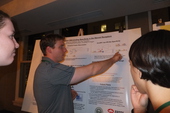Highlight
Training scientific symposium The Future of Evo-Devo
Achievement/Results
The IGERT trainees achieved an inspiring result by organizing a highly successful symposium on February 10-12, 2012 entitled: ‘The Future of Evo-Devo: Genomes in context: systems, populations, and environment.’ This was important in two ways, in training the trainees and in shaping the discipline. First, the act of organizing the meeting under the guidance of training faculty gave trainees an opportunity to read a substantial amount of cross-disciplinary literature, evaluate current issues, and decide which issues are most important. In addition, it gave trainees an opportunity to make personal contacts with leaders in the field, to invite distinguished scientists as speakers, to interact with the speakers personally, and discus with the distinguished speakers about the trainees’ work and the speaker’s work. Second, the meeting helped to shape the future of the field, as discussed below.
The symposium event solved three types of problems. The first problem is that sometimes journal clubs are not well focused or motivated. The second problem is that students don’t often have time to talk directly to experts from around the country about their work in an atmosphere of individualized attention. The third problem is that students working in a single university much too infrequently have the opportunity to talk to other graduate students from other universities about their work, which can spur enthusiasm.
Address Goals
The interdisciplinary theme of our IGERT project made this work possible because it brought together graduate trainees in evolution, genetics, and bioinformatics in the way a single-discipline grant would not. We were able to support trainees from the computer science department, which wouldn’t have been possible on, say, our developmental biology training grant from NIH. This symposium itself investigated the success of the EvoDevo field in characterizing non-model organisms, placing genomes in a comparative context, working across development stages, measuring variation within and across populations and looking for developmental genetic mechanism that lead to variation. Students invited external experts in the field to speak and in doing so enlarged their professional scientific network. Speakers included: Matt Rockman, New York University; Peter Andolfatto, Princeton; Anna Di Rienzo, University of Chicago; Paul Hohenlohe, University of Idaho; Stephen Giovannoni, Oregon State University; Alexander Johnson, UC, San Francisco; Michael Levine, UC, Berkeley; Antonia Monteiro, Yale University; David Parichy, University of Washington; Karen Sears, University of Illinois; Günter Wagner, Yale; Jens Walter, University of Nebraska; Shozo Yokoyama, Emory. A main outcome of the symposium arose from Keynote speaker Matt Rockman (New York University), who focused on the problem of ‘mission creep’ in the study of Evolution, Development and Genomics. He observed that EvoDevo researchers have begun to move away from the fundamental problems of what makes organisms unique and how these novel phenotypes arise towards investigating more narrow questions that can be addressed with newly available tools. Specifically, he is concerned that the promise of integration in Evolution, Development and Genomics – the subject of our IGERT – has instead been replaced by balkanization of the fields. This point of mission creep clearly resonated with graduate student trainees because it had been a constant point of discussion in our weekly journal club meetings over the last two years. Trainees have been choosing papers that, although touching on other areas of the triumverate, still focused mainly on genomics OR evolution OR development.
The week following the symposium, training faculty and trainees had a long discussion during our weekly journal club about EvoDevo mission creep. Trainees decided that this problem warrants deeper investigation, so to re-center our investigations and counteract perceived mission creep, for the next term’s topic we chose to investigate the evolution of developmental reaction norms. Trainees agreed that they would specifically choose papers to read and discuss that exemplified the best integrative approaches, and that we would revisit our discussion at the end of the term as to whether mission creep in evolution, developmental and genomics was a problem, and if so what could be done about it, or if it is a necessary next phase in the maturation of our field.






